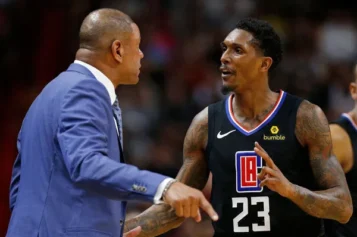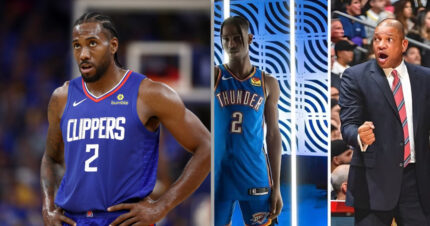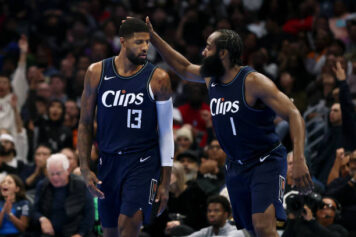He’s more than just Doc’s son.
When Los Angeles Clippers point guard Austin Rivers was taken with the 10th overall pick in the 2012 draft after one season of college basketball, some speculated that he was too small, wiry and lacking upper body strength, to be ready for the NBA.
While his ability to hit the pull up jumper off the dribble earned him high grades from Draftexpress.com coming out of Duke, they also questioned his inability to do a number of things, like being able to catch and shoot with proficiency, his efficiency, decision-making and ability to play off the ball.
He and No. 1 overall pick Anthony Davis were slated to be the cornerstones of a New Orleans franchise that had recently lost Chris Paul to the Los Angeles Lakers.
Austin’s play has been rather lukewarm from the very beginning and marred by injury as well. His first start was in October of 2012 against the San Antonio Spurs and he tallied 7 points on 1-9 shooting. In December of his rookie year, he’d drop 27 points against the Timberwolves, but went on to average only 6.2 points for the season on 37% shooting. Ankle surgery immediately following the draft and a broken hand in March 2013 had some concerned about his durability.
Rivers hasn’t played 82 games in a season in his four-year career. After starting 26 games during his rookie season, he hasn’t started more than seven games in a season since. The writing was on the wall in New Orleans as the franchise declined a fourth-year option on Rivers rookie scale contract. In addition to injury and inconsistency, Rivers had to deal with the increasing whispers that said he would be languishing in the NBA D-League had it not been for his father, Doc Rivers, an NBA championship-winning head coach.
Rivers has a career free throw average of .637 percent and a shooting percentage that hovers around 40 percent. It seemed like he had manifested all of the negative concerns of prognosticators as to his NBA skills, but was only sporadically able to brandish the positive attributes due to lack of efficiency. Also, Rivers’ career assists-to-turnover ratio is 2:1.
Rivers arrival in Los Angeles to play for the Clippers, whose head coach happened to be his father, was met with a great deal of criticism from his peers, sports commentators and fans alike. Many of them openly questioned his role on a team that already had a starting shooting guard in fellow Duke alum J.J. Redick and a quality backup shooting guard in Jamal Crawford, who is also considered one of the best bench players of the past 25 years. Additionally, Austin’s looseness with the basketball and his scorer’s mindset when penetrating seemed to show him as being ill-suited to play backup point guard.
It seemed like he had finally earned his propers after scoring 25 points in the Clippers’ 124-99 Game 3 victory over the Houston Rockets in the 2015 Western Conference Semifinals. Perhaps the fact that the Rockets eventually stormed back to win that series forced him to face the same criticisms he’s dealt with since his rookie year when the 2015-16 season started.
Back in March, Portland Trail Blazers shooting guard C.J. McCollum clapped at Rivers by alluding that he was only in Los Angeles so that his father could protect him. Though Portland eliminated the decimated Los Angeles Clippers from the playoffs this year, a gritty, bloody and impassioned performance by Austin Rivers is one of the reasons, in addition to Jamal Crawford’s 32 points, why the Clips weren’t completely blown out of the water in Game 6.
Rivers scored 21 points, had eight assists (zero turnovers), six rebounds and 11 bloody stitches. Some people knew that it would take Rivers some time to grow into the NBA game. Others thought he was simply a beneficiary of his daddy being his coach.
I ask you, after the heart, he showed in game six and delivering for his team while looking like a legitimate NBA player, can Austin Rivers get some ‘respeck’ on his name next season?



